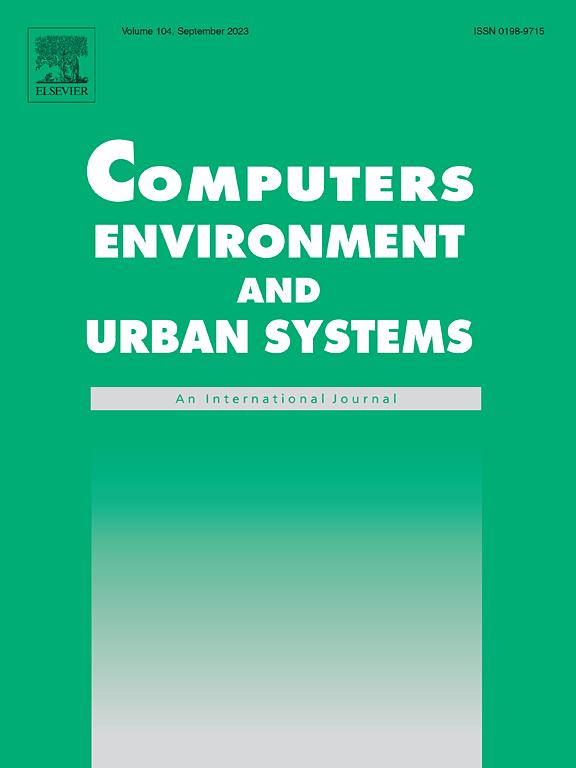ZenSVI: An open-source software for the integrated acquisition, processing and analysis of street view imagery towards scalable urban science
IF 8.3
1区 地球科学
Q1 ENVIRONMENTAL STUDIES
Computers Environment and Urban Systems
Pub Date : 2025-03-20
DOI:10.1016/j.compenvurbsys.2025.102283
引用次数: 0
Abstract
Street view imagery (SVI) has been instrumental in many studies in the past decade to understand and characterize street features and the built environment. Researchers across a variety of domains, such as transportation, health, architecture, human perception, and infrastructure have employed different methods to analyze SVI. However, these applications and image-processing procedures have not been standardized, and solutions have been implemented in isolation, often making it difficult for others to reproduce existing work and carry out new research. Using SVI for research requires multiple technical steps: accessing APIs for scalable data collection, preprocessing images to standardize formats, implementing computer vision models for feature extraction, and conducting spatial analysis. These technical requirements create barriers for researchers in urban studies, particularly those without extensive programming experience. We developed ZenSVI, a free and open-source Python package that integrates and implements the entire process of SVI analysis, supporting a wide range of use cases. Its end-to-end pipeline includes downloading SVI from multiple platforms (e.g., Mapillary and KartaView) efficiently, analyzing metadata of SVI, applying computer vision models to extract target features, transforming SVI into different projections (e.g., fish-eye and perspective) and different formats (e.g., depth map and point cloud), visualizing analyses with maps and plots, and exporting outputs to other software tools. We demonstrated its use in Singapore through a case study of data quality assessment and clustering analysis in a streamlined manner. Our software improves the transparency, reproducibility, and scalability of research relying on SVI and supports researchers in conducting urban analyses efficiently. Its modular design facilitates extensions of the package for new use cases. This package is openly available at https://github.com/koito19960406/ZenSVI, and it is supported by documentation including tutorials (https://zensvi.readthedocs.io/en/latest/examples/index.html).

ZenSVI:一款开源软件,用于集成街景图像的采集、处理和分析,以实现可扩展的城市科学
在过去的十年中,街景图像(SVI)在许多研究中发挥了重要作用,以了解和表征街道特征和建筑环境。不同领域(如交通、健康、建筑、人类感知和基础设施)的研究人员采用了不同的方法来分析SVI。然而,这些应用和图像处理程序尚未标准化,并且解决方案是孤立实施的,这往往使其他人难以复制现有工作并开展新的研究。使用SVI进行研究需要多个技术步骤:访问api以进行可扩展的数据收集,预处理图像以标准化格式,实现计算机视觉模型以进行特征提取,并进行空间分析。这些技术要求给城市研究人员,特别是那些没有广泛规划经验的研究人员造成了障碍。我们开发了ZenSVI,这是一个免费的开源Python包,它集成并实现了SVI分析的整个过程,支持广泛的用例。其端到端流程包括从多个平台(如Mapillary和KartaView)高效下载SVI,分析SVI元数据,应用计算机视觉模型提取目标特征,将SVI转换为不同的投影(如鱼眼和视角)和不同的格式(如深度图和点云),用地图和绘图将分析可视化,并将输出输出到其他软件工具。我们通过一个精简方式的数据质量评估和聚类分析的案例研究展示了它在新加坡的使用。我们的软件提高了依赖于SVI的研究的透明度、可重复性和可扩展性,并支持研究人员有效地进行城市分析。它的模块化设计便于为新的用例扩展包。该软件包可在https://github.com/koito19960406/ZenSVI上公开获得,并由包括教程在内的文档(https://zensvi.readthedocs.io/en/latest/examples/index.html)提供支持。
本文章由计算机程序翻译,如有差异,请以英文原文为准。
求助全文
约1分钟内获得全文
求助全文
来源期刊

Computers Environment and Urban Systems
Multiple-
CiteScore
13.30
自引率
7.40%
发文量
111
审稿时长
32 days
期刊介绍:
Computers, Environment and Urban Systemsis an interdisciplinary journal publishing cutting-edge and innovative computer-based research on environmental and urban systems, that privileges the geospatial perspective. The journal welcomes original high quality scholarship of a theoretical, applied or technological nature, and provides a stimulating presentation of perspectives, research developments, overviews of important new technologies and uses of major computational, information-based, and visualization innovations. Applied and theoretical contributions demonstrate the scope of computer-based analysis fostering a better understanding of environmental and urban systems, their spatial scope and their dynamics.
 求助内容:
求助内容: 应助结果提醒方式:
应助结果提醒方式:


